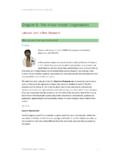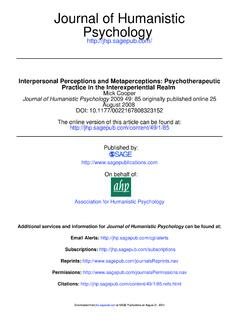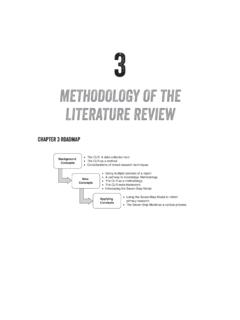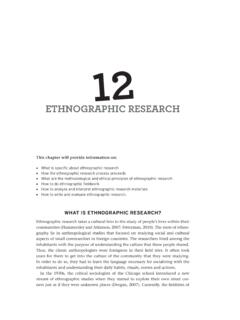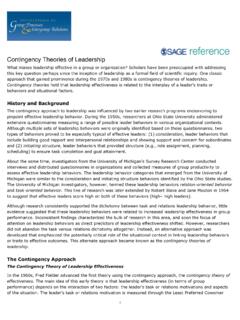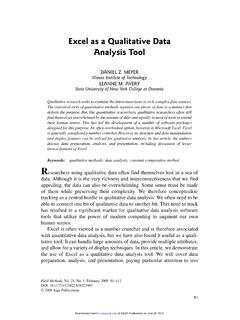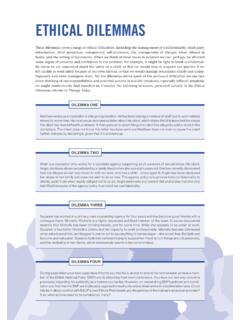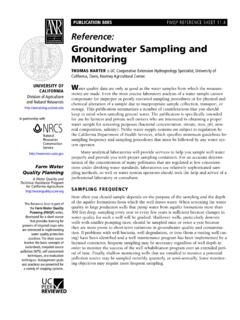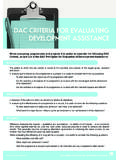Transcription of Focus Groups as Qualitative Research
1 Focus Groups asQualitative ResearchPLANNING AND RESEARCHDESIGN FOR Focus GROUPSC ontributors: David L. MorganPrint Pub. Date: 1997 Online Pub. Date:Print ISBN: 9780761903437 Online ISBN: 9781412984287 DOI: pages: 32-46 This PDF has been generated from SAGE Research Methods. Please note that thepagination of the online version will vary from the pagination of the print 2013 SAGE Research MethodsPage 2 of 18 Focus Groups as Qualitative Research : PLANNINGAND Research DESIGN FOR Focus AND Research DESIGNFOR Focus GROUPSThis chapter addresses the planning that must be done prior to doing Focus it and the next chapter on how to conduct and analyze Focus Groups will havemore emphasis on technical procedures. Such practicalities are an important aspectof any Research technique, and Focus Groups do not differ greatly from other qualitativemethods of data collection in this regard.
2 In particular, the framework for the next twochapters is based on Kirk and Miller's (1986) general description of the four phases ofqualitative Research : planning, observation, analysis, and these four phases in the life of a Research project, this presentation will devote oneentire chapter to the planning phase. I emphasize planning because this is the areawhere Focus Groups depart most from standard practices in other Qualitative fact that they are group interviews is the source of most of these planning particular, the need to bring together several participants requires attention to whothe participants are and how the researcher will interact with them as a group. Oncethe choices surrounding the format of the group interview are made, the subsequentobservation, analysis, and reporting phases mostly pose issues that are already familiarto experienced Qualitative StartingThree obvious factors that affect the ability to plan are ethical concerns, budget issues,and time constraints.
3 In many respects, the ethical concerns in Focus Groups are similarto those raised in all Qualitative Research (Punch, 1986), but the specific concernsgenerated by Focus Groups also require attention (Smith, 1995). Issues concerninginvasion of privacy are especially important whenever taping is the primary means ofdata collection. Actual audio and visual presentations of tapes are relatively rare in thesocial sciences, but they can be very tempting in the case of Focus Groups . No amountSAGEC opyright 2013 SAGE Research MethodsPage 3 of 18 Focus Groups as Qualitative Research : PLANNINGAND Research DESIGN FOR Focus GROUPSof accuracy in transcription will ever substitute for the excitement of actually listeningto an emotional exchange among participants, and videotapes can be even moreseductive.
4 It is thus wise to decide up front who will hear or see the tapes. My advicewould be to limit this access to the Research staff; unless you know from the beginningthat public presentation of the tapes will be an integral part of the Research , it is best torule out this option altogether.[p. 32 ]One unique ethical issue in Focus Groups is the fact that what participants tell theresearcher is inherently shared with other group participants as well. This raisesserious invasion of privacy concerns and effectively limits the kinds of topics that theresearcher can pursue. Such limitations are actually practical as well as ethical: It isnot a productive use of Focus Groups to ask people to talk with discussion partnerswith whom they are not comfortable.
5 In other words, most Focus Groups that involvean invasion of privacy are also a waste of the researcher's time. Note, however, thatthis argument does not necessarily apply to Groups of self-acknowledged deviants,especially if they are members of deviant subcultures in which the informal equivalent offocus group discussions occur. That case requires the usual protection of participants,with the added assurance that all the participants in each discussion truly belong to theshared to budget issues as a factor in planning Focus Groups , one guideline is thatmarketing researchers often charge clients over $2,000 per group when participantscome from the general population, and this figure may double when working withspecialized Groups of participants who are more difficult to recruit.
6 If the Research isbeing subcontracted to a marketing firm, this is what it will cost. If you are doing some ofthe work yourself, it will probably cost substantially cost factors include salaries to moderators, travel to Research sites, rental ofresearch sites, payments to participants, and producing and transcribing tapes. Many ofthese costs are essentially fixed by the circumstances of the specific Research project,but substantial savings are possible if the researcher has the time and skills necessaryto perform the moderator function. This is especially true if the only alternative ishiring an outside moderator because these skills often have a price tag that is moreSAGEC opyright 2013 SAGE Research MethodsPage 4 of 18 Focus Groups as Qualitative Research : PLANNINGAND Research DESIGN FOR Focus GROUPSin line with the resources of corporate clients rather than academics.
7 One cost-savingcompromise is to hire a moderator whose sole role is to conduct the Groups and not toanalyze the data. This not only takes advantage of the professional moderator's specificskills but also recognizes that the task of making sense of the data is best handled bythose who will ultimately be responsible for its use. Even this compromise, however,requires that the Research team allocate both time and money for working with theoutside moderator to plan the project because both parties must have a truly sharedunderstanding of the Research objectives and science Research projects vary considerably in the time constraints that theyplace on Focus Groups . When the Focus Groups serve a specific [p. 33 ] purpose withina larger project, such as producing questions for a survey instrument or guiding thedesign of an intervention program, then such Groups may need to be done on tighttimelines.
8 Typically, the time savings for such work comes from less detailed analyses ;because the uses for the Groups are quite explicit, the summary of their content is morestraightforward. In these limited cases, the entire Focus group project may be completedin just a few weeks. The kind of Qualitative Research that would satisfy journal reviewersor a dissertation committee, however, may require time for not only more detailedanalyses of transcripts but also the possibility of returning to the field for more the planning phase, the design decisions themselves typically require at least 2weeks more if the project is complex or if the Research team is inexperienced with themethod. Furthermore, the recruitment of participants may be quite time-consuming,especially when using specialized populations or comparing multiple categories ofparticipants.
9 In the observation phase, although each group takes only a few hours,conducting two a day, or even five a week, can be a killing pace without either a verylarge staff or considerable reliance on outside services. Finally, in terms of analysisand reporting, transcript typing is slow, and transcript analysis is very on the number of Groups , the availability of the participants, and the kind ofanalysis intended for the transcripts, count on a project taking between 3 and 6 months(longer if the staff divide their time between this project and other commitments).From the beginning, it is important to have realistic expectations not just with regardto budget and time but also in terms of the total amount of investigator effort that isnecessary to produce the desired data.
10 This is hardly a new problem, but because ofSAGEC opyright 2013 SAGE Research MethodsPage 5 of 18 Focus Groups as Qualitative Research : PLANNINGAND Research DESIGN FOR Focus GROUPSthe relative novelty of Focus Groups in social science Research it deserves attention. Thereputation that Focus Groups have in some circles as a quick and cheap technique isdue to the very limited function to which they have too often been relegated: preliminaryexplorations to set the stage for real Research . Indeed, Morgan and Krueger's (1993)catalog of myths about Focus Groups includes the idea that they are either quick orcheap. When pursued as a self-contained Research technique, Focus Groups demandthe same attention to detail as any other means of data collection.
